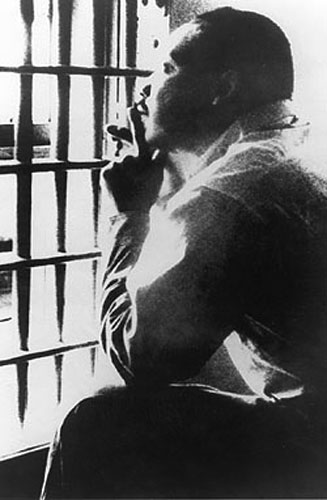|
|
Online Texts for Craig White's Literature Courses
|
|
|
Passages on Non-Violent Resistance from Martin Luther King's Letter from Birmingham City Jail (1963) |
|
Dr. Martin Luther King,
Letter from Birmingham City Jail.
1963.
A
Testament of Hope: The Essential Writings of Martin Luther King, Jr.
Ed. James Melvin Washington.
San Francisco: Harper & Row, 1986.
289-302.
My dear Fellow Clergymen,
While confined here in the Birmingham city jail, I
came across your recent statement calling our present activities “unwise and
untimely.”
Seldom, if ever, do I pause to answer criticism of my work
and ideas. . . .
But since I feel that you are men of genuine good
will and your criticisms are sincerely set forth, I would like to answer your
statement in what I hope will be patient and reasonable terms. . . .
In any
nonviolent campaign there are four basic steps: (1) collection of the facts
to determine whether injustices are alive, (2) negotiation, (3)
self-purification, and (4) direct
action.
We have gone through all of these steps on Birmingham. . .
.
You may well ask, “Why direct action?
Why sit-ins, marches, etc.?
Isn’t negotiation a better path?”
You are exactly right in your call for negotiation.
Indeed, this is the purpose of direct action.
Nonviolent direct action seeks to create such a
crisis and establish such creative tension that a community that has constantly
refused to negotiate is forced to confront the issue.
It seeks so to dramatize the issue that it can no
longer be ignored. . . .
Just as
Socrates felt that it was necessary to create a tension in the mind so that
individuals could rise from the bondage of myths and half-truths to the
unfettered realm of creative analysis and objective appraisal, we must see the
need of having nonviolent gadflies to create the kind of tension in society that
will help men to rise from the dark depths of prejudice and racism to the
majestic heights of understanding and brotherhood. . . .
You express a great deal of anxiety over our
willingness to break laws.
This is certainly a legitimate concern.
Since we so diligently urge people to obey the
Supreme Court’s decision of 1954 outlawing segregation in the public schools, it
is rather strange and paradoxical to find us consciously breaking laws.
One may well ask, “How can you advocate breaking
some laws and obeying others?”
The answer is found in the fact that there are
two types of
laws: there are just and there are
unjust laws.
I would agree with
Saint Augustine that “ An unjust law is
no law at all.”
Now what is the difference between the two?
How does one determine when a law is just or unjust?
A just law is a man-made code that squares with the
moral law or the law of God.
An unjust law is a code that is out of harmony with
the moral law.
To put it in the terms of
Saint Thomas Aquinas, an unjust law is a
human law that is not rooted in eternal and natural law.
Any law that uplifts human personality is just.
Any law that degrades human personality is unjust.
All segregation statutes are unjust because
segregation distorts the soul and damages the personality.
It gives the segregator a false sense of
superiority, and the segregated a false sense of inferiority. . . .
[M]aybe the South, the nation, and the world are in
dire need of creative extremists.


—
[ ]


